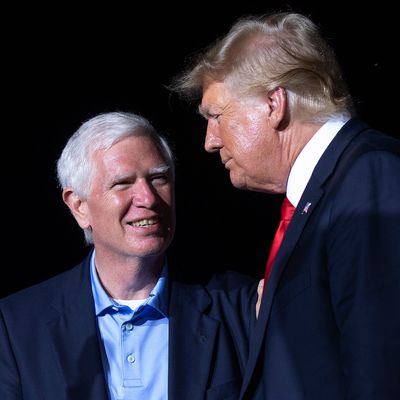
Those hoping or fearing that Trumpism will become consolidated as the ideological creed of the Republican Party going forward are understandably focused on the 45th president’s activities and utterances. But there are growing signs that his malignant worldview is developing a life of its own, and will take a giant leap toward control of the GOP in 2022 Senate primaries to replace retiring Establishment types. As Politico’s Marc Caputo observes: “The 2022 midterms could usher in a wave of full-spectrum MAGA supporters who would turn the GOP conference an even deeper shade of red — and make the Senate a lot more like the fractious House.”
Five Republican senators have already announced retirements next year: Missouri’s Roy Blunt, North Carolina’s Richard Burr, Ohio’s Rob Portman, Alabama’s Richard Shelby, and Pennsylvania’s Pat Toomey. Burr and Toomey voted to convict Trump in the 2021 impeachment trial, an obviously unforgivable offense to the GOP base. Blunt, Burr, and Portman also supported the bipartisan infrastructure bill that recently passed in the Senate, to the great fury of Republicans who viewed this action as either a betrayal of True Conservatism or as a larcenous misappropriation of a triumph denied to America’s real president. As the chairman of the socialistic Appropriations Committee, a close friend of Mitch McConnell, and a supporter of the treacherous Jeff Sessions’s 2018 comeback bid, Shelby is deemed unacceptably swampy.
All of these less-than-Trumpy lawmakers could be replaced (as Senate nominees if not necessarily elected U.S. senators) by loud-and-proud proponents of the America First cause, reports Caputo:
The three top candidates to succeed Sen. Richard Burr in North Carolina have all denounced his vote to convict Trump in his last impeachment trial. In Pennsylvania, the four leading candidates to succeed Sen. Pat Toomey — who, like Burr, was formally rebuked by the state party for his impeachment vote — have embraced Trump’s calls for an “audit” of the state’s presidential election results, to varying degrees …
The bipartisan infrastructure deal Ohio’s Sen. Rob Portman helped broker? Six of the top GOP candidates vying to replace him have rejected it.
In some of these states with retiring “moderates,” there are Trumpier-than-thou competitions underway (notably in Ohio, where Josh Mandel, Jane Timken, and J.D. Vance are fighting for the 45th president’s favor). In others, one or more major candidates are going maximum MAGA to an extent that makes Republicans nervous about their general-election prospects in a year where there is no margin for error if the GOP is to retake Senate control. In the latter category is Missouri, where disgraced former Governor Eric Greitens may be too Trumpy for Trump himself (the former president is reportedly annoyed that his son’s significant other, Kimberly Guilfoyle, has been named national campaign chair for Greitens). In Alabama, the ever-fiery Mo Brooks, who spearheaded the challenge to Joe Biden’s Electoral College victory in Congress on January 6 and spoke at the notorious “Stop the Steal” rally on the National Mall that very day, recently benefited from a Trump attack on Shelby and his designated successor Katie Britt: “I see that the RINO Senator from Alabama, close friend of Old Crow Mitch McConnell, Richard Shelby, is pushing hard to have his ‘assistant’ fight the great Mo Brooks for his Senate seat.”
The potential MAGA makeover of the Senate Republican Conference isn’t limited to the states of the five previously announced retirees. Trump nemesis Lisa Murkowski of Alaska is up next year and has not announced her intentions. If she does run, Alaska’s new top-four primary system all but guarantees the incumbent a spot in the general election, but she is vulnerable to a loss of Republican support to Kelly Tshibaka, a former state-level administrator who already has Trump’s endorsement (Sarah Palin also keeps hinting at participation in this contest as well). Eighty-seven-year-old Chuck Grassley’s future is also in limbo, and even if he runs for an eighth term in 2022, he will be opposed by state senator Jim Carlin, a Trump bravo who wants to investigate nonexistent 2020 election fraud and vows to fight “mammoth challenges from China, the disintegration of families, the decline of rural Iowa and the threat to free speech from big tech monopolies.” And South Dakota’s John Thune, who has drawn the ire of Trump supporters by mocking his 2020 Big Lie, could step down or attract a primary challenger next year (Governor Kristi Noem has said she’s not interested in taking down Thune for Trump, but could change her mind).
Any way you slice it, it’s very likely Senate Republicans overall will be less “traditional” in their conservatism in 2023. Whether or not they win back control of the chamber in the midterms, that’s bad news for any residual bipartisan plans Joe Biden might have for the balance of his first term, and good news for Trump or potential successors to the leadership of the right-wing “populist” political movement he has created.






























